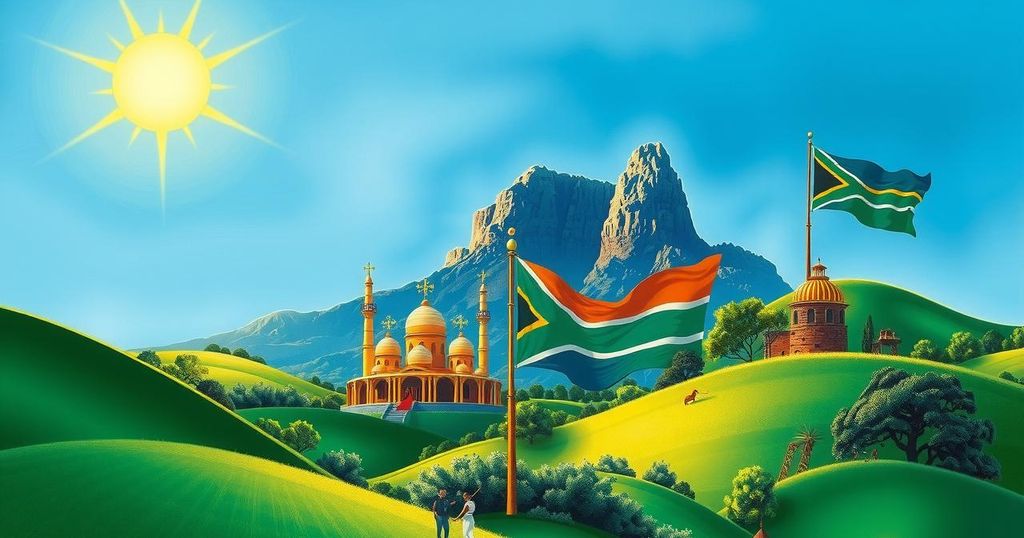South Africa Celebrates Freedom Day: A Reflection on Resilience and Opportunity

South Africa commemorates Freedom Day on April 27th, marking its first democratic elections in 1994. The country is navigating a new political landscape with President Cyril Ramaphosa’s Government of National Unity, sparking cautious optimism for economic reforms. Despite ongoing challenges, including high unemployment and infrastructural issues, South Africa retains its stature as Africa’s largest economy. Recent trade agreements with Thailand highlight the country’s growing international partnerships and economic promise as it continues on its journey of resilience and transformation.
Every April 27th, South Africa celebrates Freedom Day, a significant occasion marking the first democratic elections held in 1994. This date is a reminder of the country’s journey from a history of apartheid to a present defined by resilience and a diverse cultural identity. South Africa, often referred to as the rainbow nation, serves as an emblem of hope and transformation, showcasing a blend of rich traditions and a promising economy.
This year, on Freedom Day, as the nation reflects on its achievements, there’s a cautious optimism in the air, particularly in light of recent political developments. President Cyril Ramaphosa recently took the reins of a Government of National Unity (GNU) established in June 2024, which aims to promote stability and address ongoing political challenges. Financial markets seemed to respond positively, hinting at a renewed belief in potential economic reforms, though concerns linger.
As the largest economy on the African continent, South Africa’s gross domestic product (GDP) is projected to grow by 1.5% in 2025, according to the International Monetary Fund. This represents a slight recovery compared to the previous year, driven primarily by strong sectors like financial services. Yet, the nation faces some tough obstacles, including infrastructure inadequacies and ongoing issues with the electricity supply, which continue to impede progress.
Despite an unsettling unemployment rate of 31.9% and inflation averaging 4.4% last year, South Africa holds its ground as a central player in Africa’s economic landscape. With a debt-to-GDP ratio of 77.4% and notable income disparities, the country’s financial health is still under scrutiny, but there’s a silver lining in its diverse economy.
Geographically, South Africa is a marvel, positioned at the southern tip of the continent and home to over 60 million residents. With 12 UNESCO World Heritage Sites, including famed locations like Robben Island and the Cradle of Humankind, the nation is celebrated for its cultural wealth and historical significance. Iconic sites like Table Mountain and Kruger National Park attract tourism, while Blyde River Canyon stands as one of the largest canyons globally.
Culturally, South Africa displays a riveting tapestry woven from the influences of indigenous African customs, European settlers, and Indian cultures, resulting in a unique national identity. The country is lively, especially when it comes to sports; football, rugby, and cricket hold a special place in the hearts of South Africans and often serve as a unifying force.
In an encouraging move for international economic ties, South Africa recently solidified trade relations with Thailand. A new agreement will see Thailand exporting 300,000 metric tonnes of rice to South Africa for around $156 million. The growing trade between the countries highlights a relationship that encompasses automobiles, electronics, and agriculture from Thailand while supplying minerals, wine, and fresh produce from South Africa.
As South Africa observes its National Day, it finds itself at a crucial juncture—facing up to challenges but also embracing new opportunities. The nation’s resilient spirit, complex economy, and rich heritage set the stage for a promising future. Observers from around the globe are keenly watching as South Africa continues to carve out its path towards growth and transformation.
In summary, South Africa’s Freedom Day not only commemorates its past struggles but also illuminates the present and future of this vibrant nation. With new political leadership and strategic economic partnerships, signs of optimism are emerging amid significant challenges. The country remains a key player in Africa’s economic growth, and its dynamic culture adds to its global influence. As it charts its way forward, South Africa is poised to inspire and innovate, shaping its destiny in the years to come.
Original Source: www.nationthailand.com







